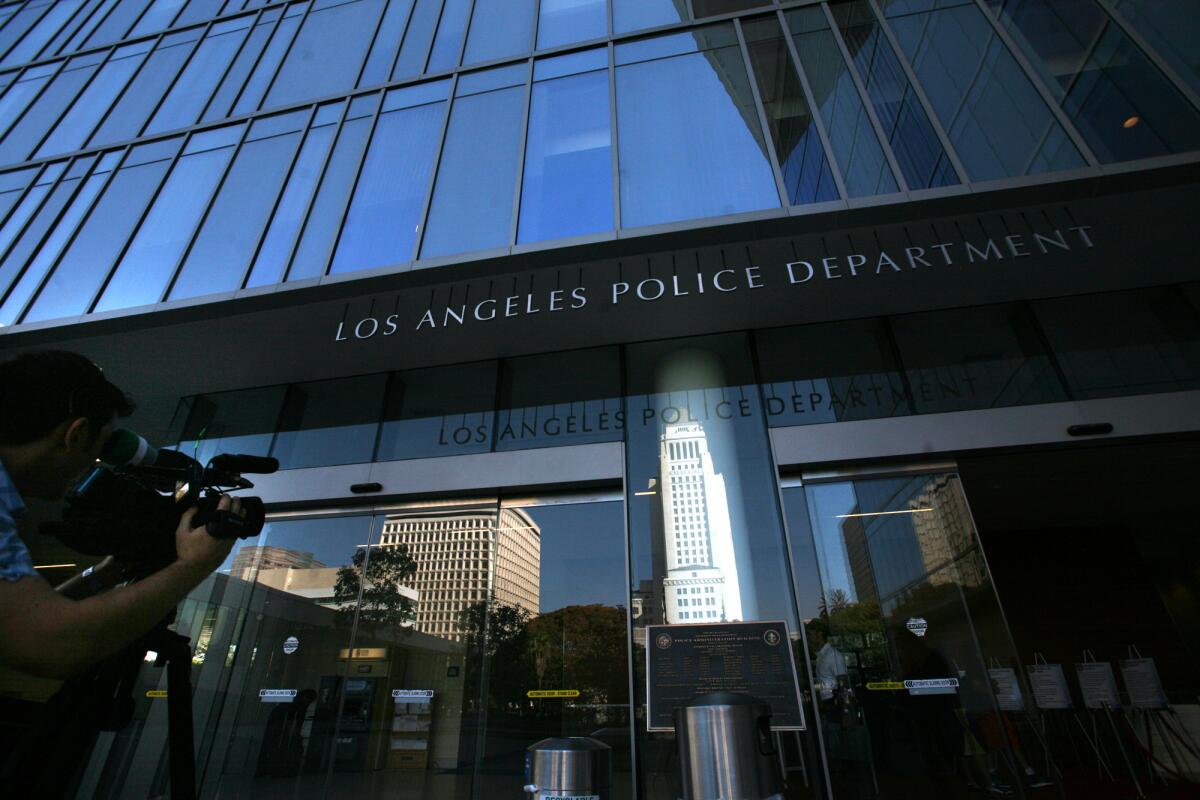In nod to criticism, L.A. County law enforcement agencies discussing joint investigations of police killings

- Share via
Amid growing skepticism of police agencies that investigate killings by their own officers, top law enforcement officials in the Los Angeles region have reached a tentative agreement to cede the work instead to a centralized task force.
Few details have been worked out, but an initial consensus to have all police killings investigated by the task force was reached this week by Los Angeles County Sheriff Alex Villanueva, Los Angeles Police Chief Michel Moore, Dist. Atty. Jackie Lacey and Anthony Miranda, vice president of the Los Angeles County Police Chiefs’ Assn.
The goal, according to a letter all four wrote to California Atty. Gen. Xavier Becerra, is to have cooperation from every law enforcement agency in the county, with those agencies, the LAPD and the sheriff’s office contributing investigators.
“The purpose of this task force is to further strengthen police departments to be transparent, objective, and accountable in their practices,” the letter said.
Becerra did not respond to a request for comment.
Lacey, who has faced harsh criticism over her record of declining to prosecute most officers who use force against civilians, said she “wholeheartedly” supports the idea — which would still leave the power to criminally charge an officer with her office.
“By sharing resources, we can assure that law enforcement agencies in Los Angeles County no longer investigate their own when use of force turns deadly,” Lacey said. “The proposed task force also would allow us to formalize protocols across all agencies and give every case the same investigative resources and level of scrutiny.”
The plan drew immediate criticism from some reform advocates who said it leaves investigations of police in the hands of police and smacks of political expediency for local law enforcement officials who suddenly find themselves in the cross hairs of increasingly influential reform groups.
The task force would leave death investigations in the hands of local officers, but from various agencies. One protocol under discussion would prohibit task force members from investigating officers or deputies from their own agencies.
Criminal justice reform advocates, including Black Lives Matter L.A., have long called for more independence in such investigations — though they would like to see police removed from the equation entirely.
In recent weeks, calls for independence have mounted: The U.S. Conference of Mayors recently called on cities to have independent investigators review police killings. A bill pending in Sacramento would require the state’s Department of Justice to review fatal police shootings.
Capt. John Burcher, Villanueva’s chief of staff, said Villanueva came up with the task force idea a few weeks ago, and decided to reach out to Lacey and Moore about it in part because of the recent “public outcries over more accountability and transparency.”
Protests over police killings, of George Floyd in Minneapolis but also other Black men and women across the country, have been occurring in Los Angeles and elsewhere for the past month.
Burcher and other officials stressed that the task force idea is in its infancy, and that while an agreement has been reached in principle, the agencies still have to hash out many details.
“Right now it’s just an idea. A steering committee hasn’t even been formed,” Burcher said.
Moore said he has talked to Villanueva directly and to various other chiefs in the region about the task force, but they still “need to get together and figure out the nuances.”
Many local law enforcement agencies have different rules, and different equipment. The LAPD is controlled by its civilian Police Commission and reforms have been implemented over the course of decades. With so much at stake in cases in which police officers have killed someone, “you don’t just willy-nilly go into an agreement saying, ‘OK, we’ll have someone else [investigate] it,’” Moore said.
In the past, agencies have squabbled with each other during cross-border investigations, including as to when and whether to release certain evidence. And more disputes will arise if the rules for how the task force will operate aren’t carefully worked out in advance, Moore said.
One issue to discuss is body-camera footage, Moore said. Under protocols controlled by the Police Commission, the LAPD must release footage of shootings and other critical incidents after 45 days. Meanwhile, sheriff’s deputies don’t even have cameras.
The agencies also have different rules as to whether or not officers can be compelled to give statements, and when in the investigation that can occur, Moore said.
He remains confident the task force will work, but stressed it is in its earliest stages of being developed.
Carl Douglas, who has litigated and investigated dozens of police shootings by the LAPD and the Sheriff’s Department, said he “cannot imagine a worse idea if you want true reform.”
Under the new arrangement, law enforcement officers will still be investigating other law enforcement officers, and the public still won’t get a truly independent investigation, he said.
“The foxes are still looking after the hen houses,” he said. “It is a public relations stunt to seem progressive. It comes at a time when both the district attorney and sheriff are desperately grasping for political survival. They are trying to exploit fair-minded Angelenos who are yearning for real reform.”
Few law enforcement leaders in the region have been spared criticism of late. Lacey is up for reelection.
The concept of outsourcing investigations into police killings to a independent or somewhat independent body is not new.
In San Francisco, the district attorney set up an independent investigations bureau to review law enforcement shootings. Bureau investigators go to all police shootings to do interviews, examine the evidence and do forensic testing.
Local officials acknowledge that the new task force would not be completely independent. Still, they think it would help.
“It’s still police investigating police, but I think the biggest takeaway from this is that we’re getting away from those closer relationships and everybody is held to a degree of accountability,” said Burcher, Villanueva’s chief of staff. “For instance if I investigate somebody who is a friend, who I worked with for a long time, I might consider a brother … there’s a chance I might be more influenced in my decision making as opposed to investigating somebody I don’t know.”
Asked why the department doesn’t also have an independent body for all internal administrative and criminal investigations if such bias is a fear, Burcher said, “You never know, that could be in the works down the road.”
L.A. County Chiefs Assn. President John Incontro, who is also San Marino Police chief, said he heard about the task force proposal Monday.
“It could be a good thing, but we’re not sure we are going to do it,” he said.
Incontro said many details need to be worked out before his organization would agree to participate.
“We need to talk some more and need to hear from all our chiefs,” he said.
More to Read
Sign up for Essential California
The most important California stories and recommendations in your inbox every morning.
You may occasionally receive promotional content from the Los Angeles Times.













